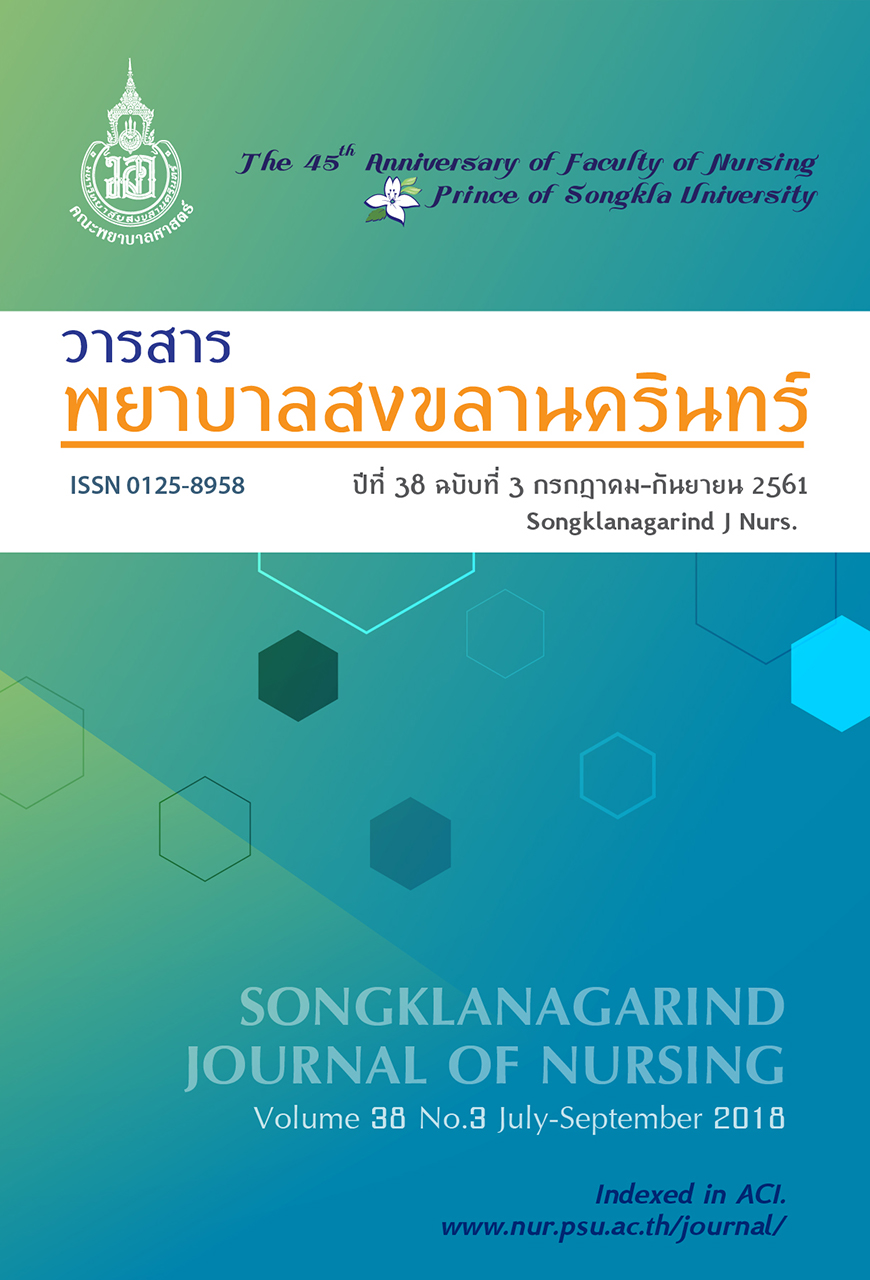ผลของโปรแกรมสนับสนุนการจัดการตนเองต่อความสามารถ ในการจัดการอาการและอาการหายใจลำบากของผู้ป่วย โรคปอดอุดกั้นเรื้อรัง
Main Article Content
บทคัดย่อ
โรคปอดอุดกั้นเรื้อรัง เป็นโรคไม่ติดต่อเรื้อรังที่ไม่สามารถรักษาให้หายขาดได้ อาการหายใจลำบากเป็นอาการที่พบ
ในผู้ป่วยทุกคน เมื่อมีอาการมากแล้วและเริ่มส่งผลกระทบต่อการปฏิบัติกิจวัตรประจำวัน ทำให้เกิดความทุกข์ทรมานกับอาการนี้
ไปตลอดชีวิต การวิจัยกึ่งทดลองนี้มีวัตถุประสงค์ เพื่อศึกษาผลของโปรแกรมสนับสนุนการจัดการตนเองต่อความสามารถ
ในการจัดการอาการ และอาการหายใจลำบากของผู้ป่วยโรคปอดอุดกั้นเรื้อรัง จำนวน 52 ราย คัดเลือกแบบเฉพาะเจาะจง
ตามคุณสมบัติที่กำหนด แบ่งเป็นกลุ่มควบคุมและกลุ่มทดลอง กลุ่มละ 26 ราย โดยจับคู่ตามคุณสมบัติดังนี้ 1) เพศ 2) อายุ
ต่างกันไม่เกิน 5 ปี และ 3) ระดับความรุนแรงของโรค อยู่ในระดับ 1 และ 2 กลุ่มควบคุมได้รับการพยาบาลตามปกติ กลุ่มทดลอง
ได้รับโปรแกรมสนับสนุนการจัดการตนเอง โดยส่งเสริมให้มีความสามารถในการจัดการอาการด้วยเทคนิค 5 เอ ของกลาสโกว
และคณะ ซึ่งผู้วิจัยสร้างขึ้น ประกอบด้วย 5 ขั้นตอนดังนี้ การประเมิน (assess) การแนะนำ (advise) การยอมรับ (agree)
การช่วยเหลือ (assist) และการติดตาม (arrange) ประเมินผลก่อนทดลองและหลังทดลองในสัปดาห์ที่ 8 ใช้แบบสอบถาม
ประเมินความสามารถในการจัดการอาการหายใจลำบากและวัดอาการหายใจลำบาก โดยใช้เกณฑ์การให้คะแนนหายใจลำบาก
(Modified Medical Research Council Dyspnea Scale: mMRC DS) วิเคราะห์ข้อมูลทั่วไปใช้สถิติบรรยาย การทดสอบ
สมมติฐานใช้สถิติทีคู่ (Paired t-test) และสถิติทีอิสระ (Independent t-test)
ผลการวิจัยพบว่า หลังได้รับโปรแกรมสนับสนุนการจัดการตนเอง คะแนนเฉลี่ยความสามารถในการจัดการอาการของ
กลุ่มทดลองสูงกว่ากลุ่มควบคุมอย่างมีนัยสำคัญทางสถิติ (p< .001) คะแนนเฉลี่ยความสามารถในการจัดการอาการหลังทดลอง
สูงกว่าก่อนทดลองอย่างมีนัยสำคัญทางสถิติ (p< .001) สำหรับคะแนนเฉลี่ยอาการหายใจลำบากของกลุ่มทดลองหลังเข้าร่วม
โปรแกรมสนับสนุนการจัดการตนเองดีขึ้นกว่าเดิม แต่ไม่แตกต่างกันอย่างมีนัยสำคัญทางสถิติ (p> .05) ส่วนคะแนนเฉลี่ย
อาการหายใจลำบากของกลุ่มทดลองดีกว่ากลุ่มควบคุม แตกต่างกันอย่างมีนัยสำคัญทางสถิติ (p< .05) จึงควรมีการเตรียม
ความพร้อมของหน่วยงาน การเตรียมบุคลากรพยาบาล ควรมีการอบรมหรือพัฒนาทักษะในการสนับสนุนการจัดการตนเองใน
ผู้ป่วยโรคเรื้อรัง ในการวิจัยครั้งต่อไป ควรศึกษาในระยะยาวเพื่อยันยันถึงความยั่งยืนของผลลัพธ์ที่เกิดจากการใช้โปรแกรมนี้
Article Details
เอกสารอ้างอิง
2. WHO. Chronic Respiratory Diseases, Burden ofCOPD. 2015. Retrieved from http://www.Whoint/respiratory/copd/burden/en/index.
3. Panyapayatjati C. More than 90% of thai peoplesuffer from emphysema. [Internet]. [cite 2014 Nov 26]. Available from: http://www. Thaihealt.or.th. Thai.
4. Boonsawat W. Breaking New Ground In COPD Management update 2012.TU Journal,10 (3), 39-47. [Internet]. [cite 2017 Nov 18]. Availablefrom:http://index.library.tu.ac.th >opac-search. Thai.
5. Global Initiative for Chronic Obstructive Lung Disease. Global Strategy for the Diagnosis, Management, and Prevention of COPD update2015. [Internet]. [cite 2014 Apr 30]. Available fromhttp://www. goldcopd. Org
6. Boonprasop S. Dyspnea: the Role of a Nurse. J health sci. 2012;17(3), 328-42. Thai.
7. Ananchaisarp T. Guidelines of the diagnosis andcare of patients with COPD. In primary care units of Prince of Songkla Hospital update 2012. [cite 2014 Apr 30]. Available from http://medinfo2.psu.ac.th>web>pdf>copd .Thai.
8. Pontep N, Wongpiriyayota A, and Sitthipakorn S. Effects of a rehabilitation program on functional capacity among COPD patients with malnourished. Tci-thaijo. 2013;31(2). 44-53. Thai.
9. Maranate N, Nana A, Sompradeekul S, et al. Editor. Guilines for Public Health Services for COPD update 2010. Bangkok: Union4print; 2010. Thai.
10. Suwanno J, Suwanno J, and Jampad L. Factorsof dyspnea and lung function and depression in elderly COPD. 2012. Rama nurs J, 15(1), 127-140. Thai.
11. Valero C, Monteagudo M, Llagostera M., et al. Evaluation of a Combined Strategy Directed towards Health-Care Professionals and Patients with Chronic Obstructive Pulmonary Disease(COPD): Information and Health Education Feedback for Improving Clinical Monitoring and Quality-of-life. 2009. [Internet]. [cite 2014Apr 30]. Available from http://www.biomedcentral.com/1471-2458/9.
12. Glasgow, R. E., Davis, C. L., Funnell, M. M.& Beck, A. (2003). Implementing practical interventions to support chronic illness self-management. The joint commission journal on quality and safety, 29(11), 563-74.
13. Glasgow R. E, Emont S, & Miller D. C. Assessing Delivery of Five ‘As’ for Patient-Centered Counseling. 2006. Pubmed J,21(3), 245-55.
14. Polit D.F. & Beck C.T. Nursing Research: Generating and Assign Evidence for Nursing Practice. 2008. 8th ed. Philadelphia: Lippincott.
15. Muangmaitong A. The effect of dyspnea self management program on quality of life in patients with COPD [master,s minor thesis].[Nakhonpathom]: Christian University; 2008. 133 p. Thai.
16. Thungtong S, Chinnawong T, & Thaniwattananon P. Effects of self–management support program for delayed progression of diabetic nephropathy on self-management behaviors and clinical outcomes in patient with uncontrolled type 2 Diabetes Mellitus. [Internet]. Songklanagarind Journal of Nursing, 35(1),76-84.Thai.
17. Wattana C. Self-management support: strategy to promote control disease. 2015. PNC J, 26(1),117-27. Thai.
18. Puwarawuttipanit W, et al. A systematic Review of Chronic care model and self-management support in Chronic illness. KB. 2016. Available from http://www.kb.hsri.or.th. Thai.
19. Sae-Tae N. Effect of discharge planning program on the self-management ability of asthmatic patients attending an emergency room in theunrest area of southern Thailand. [master,s minor thesis]. [Songkhla]: Prince of songkla University; 2009.86 p. Thai.
20. Chouythoa T. Effect of a self-management support program in patients with Chronic ObstructivePulmonary Disease on knowledge, self-management behaviors, dyspnea, and lung funcftion [master,s minor thesis]. [Chanthaburi]: Burapha University; 2015. 120 p. Thai.
21. Tinkruajeen B. Effect of a dyspnea management promotion program on Functional Capacity Among Older Persons with Chronic Obstructive Pulmonary Disease, Buddhachinaraj Hospital, Phitsanulok Province. [master,s minor thesis]. [Chiang mai]: Chiang Mai University; 2011.71 p.Thai.
22. Cohen, J. Statistical power analysis for the behavioral sciences (2nd ed.).1988. Hillsdale, NJ: Lawrence Earlbaum Associates.


